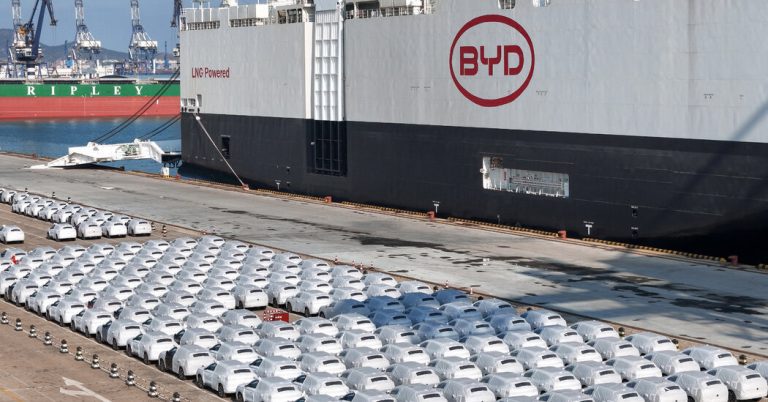The European Union announced Wednesday that it would impose additional tariffs of up to 38 percent on electric cars made in China, a move it said would help level the playing field for automakers in Europe.
The tariffs, which have been expected for months, come on top of existing 10% tariffs, but the level of their impact has been disputed. Some European automakers argue they will start a trade war, but other experts said they will not stop China’s dominance of the industry.
Instead, they argue that incentives are needed to make low-emission cars more attractive to drivers if the European Union hopes to meet its goal of banning the sale of new vehicles with internal combustion engines by 2035.
What does this mean for consumers?
Industry experts predict that increased tariffs on electric vehicles from China will hurt consumers more than Chinese automakers, raising the price of the most affordable electric cars on the market.
However, according to a European Union investigation, the entire Chinese electric car supply chain enjoys government subsidies that allow automakers there to drastically reduce their production costs. This gives Chinese producers an unfair competitive advantage over their European rivals, according to the European investigation.
BYD’s Dolphin model, for example, sells in Europe for about 32,400 euros, or about $34,900, compared to nearly 40,000 euros for a Tesla Model Y and 37,000 euros for a Volkswagen ID.4.
Curtailing EV exports to EU countries could lead more automakers in China to shift assembly to European countries like Hungary or Spain, where labor and parts costs are higher, resulting in higher costs for consumers.
How will this affect European car manufacturers?
Many European car manufacturers are heavily dependent on China, the world’s largest car market, for both exports and domestic production.
“This decision on additional import duties is the wrong way to go,” Oliver Zipse, BMW’s chief executive, said on Wednesday. “The EU Commission is thus harming European companies and European interests.”
German manufacturers — BMW as well as Mercedes-Benz and Volkswagen — not only sell to the Chinese but also have large manufacturing and research and development operations in China. They fear any retaliation from Beijing could hurt their business.
Others are still interested in partnerships with the Chinese. Last month, Stellantis said it would start selling two models in Europe from its joint venture with Chinese automaker Leapmotor as part of efforts to circumvent tariffs.
Was the EU just following the United States?
The Biden administration announced last month that it would impose new 100 percent tariffs on Chinese electric vehicles. The measure quadrupled the tariffs the United States previously levied on foreign cars in an effort to protect the American auto industry from Chinese competition.
Some analysts had worried that the lower tariffs might not be enough to stop Chinese-made electric vehicles from entering the United States, given the wide price gap between Chinese and American-made cars.
But Wendy Cutler, vice president of the Asia Society Policy Institute and a former U.S. trade official, said the 100 percent level would be high enough to block that trade. “This is what we call a prohibitive tariff. It really cuts off trade,” he added.
The European Union launched an investigation into Chinese electric vehicle subsidies in October, citing what leaders said was unfair competition, especially from China’s top three electric car makers, BYD, Geely and SAIC.
Is it a setback for climate policy?
Such tariffs have sparked a debate among some economists and climate activists about whether they are an obstacle to the fight against global warming. Gasoline vehicles are a major producer of the greenhouse gas emissions that warm the planet.
The argument against tariffs is that they make electric vehicles more expensive, slowing the transition away from fossil fuels. The Chinese government and several German automakers have adopted a similar line of reasoning, as have experts who have pointed out that Western countries should be interested in cheaper electric vehicles if they are to meet their climate change targets.
“Protective measures can only lead to higher car prices for the consumer and, in this case, also push the achievement of announced emissions targets further into the long grass,” said ManMohan Sodhi, professor of supply chain management at Bayes Business School in London.
How did the EU get here?
The European Union wants to avoid a situation similar to the one in the late 2000s, when Beijing poured large sums of money into solar technology, allowing domestic manufacturers to make multibillion-dollar investments in new factories and gain market share worldwide.
China’s production boom has caused the price of panels to plummet, forcing dozens of companies in Europe and the United States to shut down operations. This led the European Commission to launch an anti-dumping investigation that resulted in punitive duties on the Chinese panels.
But China retaliated, announcing its own probe into exports of European wine and solar panel components, a move that divided members of the bloc. This allowed China to turn them against each other, eventually leading the Europeans to retreat.
More than a decade later, Germany’s solar industry is still struggling and cheap solar panels from China dominate the market.
What happens next?
Even before Brussels announced the tariffs, demand for Chinese EVs in Europe had begun to slow as Germany and France cut subsidies for electric cars.
Last month, Great Wall Motors said it was closing its Munich headquarters, citing “an increasingly challenging European electric vehicle market, coupled with many uncertainties going forward.”
But BYD, China’s top electric car maker and sponsor of the 2024 European soccer championship that kicks off in Germany on Friday, remains focused on Europe. The company is already building a factory in Hungary and is considering a second one.
Anna Swanson contributed reporting from Washington.




